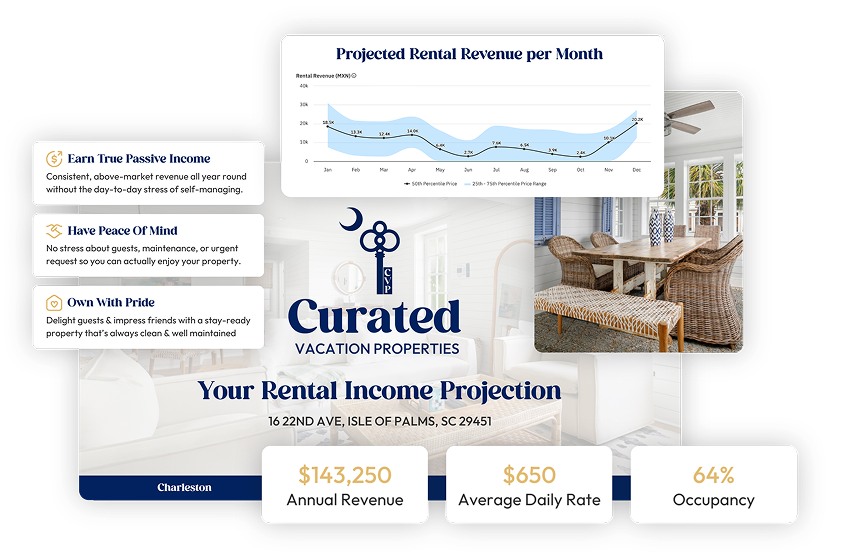The average property management fees range from 10-30% for short-term rentals. At Coastal Vacation Properties (CVP) our full-spectrum management services not only handle the daily operational tasks of rentals but also increase revenue generation. We aim to use real-time analytics and data trends to adjust rental prices for maximum profit and minimal vacancy.
Why Hire a Property Management Company?
Hiring a property manager can dramatically increase your rental property performance. With the help of our rental management company, you can expect 20-30% more income generated than other property management providers in our markets.
We ensure every vacation rental experience exceeds guest expectations with personalized items, optimized amenities, and complete check-in-to-check-out support.
Are you considering management services for your single-family home, condo, or vacation bungalow? Learn how property management can help you today.
What Do Property Managers and Management Companies Do?
A property management fee may vary significantly based on the property management firm. Generally, these firms operate and maintain rental properties on behalf of property owners. These companies provide comprehensive services, including marketing the property, screening tenants, handling maintenance and repairs, collecting rent, and communicating with tenants.
First, let’s discuss each type of property manager and management company and then get into the fees that property management companies charge.
Types of Property Management Companies for Passive Short-Term Rental Investors
Each class of property management company offers different services and caters to various property types and investors. Let’s explore the various forms of rental management companies and their benefits for passive short-term rental investors.
As you consider hiring a property manager, make sure you know the pros and cons of each management company type.
Traditional Rental Management Companies
Traditional rental management companies are the most common type of property management company. These companies provide full-spectrum services, including marketing channels, screening tenants, addressing damages and upkeep, collecting rent, and handling tenant concerns.

Benefits for Passive Short-Term Rental Investors:
- Experience and Expertise: Traditional property management companies have the experience and expertise to handle all aspects of managing a short-term rental property.
- Efficient Operations: These companies have well-established systems and procedures to ensure efficient operations and timely tenant communications.
- Reliable Tenant Screening: Traditional property management companies conduct thorough background checks on potential tenants, ensuring reliable and responsible tenants rent the property.
Disadvantages for Passive Short-Term Rental Investors:
- Costs and Expenses: Traditional property companies can be expensive, with fees ranging from 20% to 60% of monthly rental income. With a property management company that prioritizes increasing your profits, like Stay CVP, you can still gain higher value and income from your short term rental.
- Inflexibility: Certain companies may not be as flexible or adaptable to changing market conditions.
Technology-Enabled Property Management Services
Technology-enabled property management companies use technology to streamline the property management process. These companies offer services such as online booking, automating monthly rent collected, and digitizing maintenance requests.
Benefits for Passive Short-Term Rental Investors:
- Increased Efficiency: Technology-enabled rental management firms use automation and digital tools to streamline the property management process, saving time and reducing costs.
- Real-Time Access: Investors have real-time access to property data, including income, occupancy rates, and maintenance requests.
- Enhanced Tenant Experience: Good quality tech-enabled property management can improve tenant experience, including online booking and monthly rent payments, improving tenant satisfaction and retention.
Disadvantages for Passive Short-Term Rental Investors:
- Hands-Off: Online companies offer limited personal interaction with rental management professionals. If you prefer a more active role, you may not want a remote property manager.
- Expertise Issues: An online property manager may not offer the same expertise and support as a traditional property manager.
Boutique Property Management Companies
When hiring a property manager, consider a highly specialized firm. Boutique property management companies specialize in managing a specific property type, such as luxury vacation rentals or historic properties.
These companies offer highly personalized services and cater to a niche market.
Benefits for Passive Short-Term Rental Investors:
- Specialized Expertise: Boutique property management firms have specialized in managing specific types of properties, ensuring that they are well-maintained and marketed effectively.
- Personalized Services: These companies offer services tailored to the unique needs of the property and investor, creating a highly customized experience.
- Premium Branding: Boutique rental management specialists often have premium branding, enhancing the property’s appeal and maximizing income.

Disadvantages for Passive Short-Term Rental Investors:
- Increased Fees: A boutique property management company charges higher fees due to its particular specialization. How much do property managers charge? It all depends on the niche and asset.
- Service Limitations: Although the best property managers can increase ROI, they are only as effective as their level of expertise. A boutique property manager offers limited services and may fail to meet many clients’ needs.
Self-Management (You are the Property Manager)
Self-management involves managing your rental property yourself without the assistance of a property management company. This option is best suited for experienced rental property investors with the time, resources, and knowledge to handle all aspects of managing their property.
Benefits for Passive Short-Term Rental Investors:
- Control: If you are the property manager, you don’t need to worry about outsourcing property management costs or dealing with other property management fees. You have complete control of your asset, whether a condo, single-family home, apartment, or anything else.
- No Fees: As the property manager, you don’t have to pay a monthly fee or enter into a property management contract. You may have more money to reinvest and spend toward other assets and debts.
Disadvantages for Passive Short-Term Rental Investors:
- Commitment: Even if you’re a good property manager, you must dedicate significant time and effort to managing and monetizing your property. DIY rental property managers may be surprised by just how laborious it can be.
- Lack of Qualification: Professional commercial and residential property managers know how to streamline all aspects of maintenance and operation. The average property owner lacks this expertise and may struggle to optimize rental potential.
- Lack of Availability: As a property owner, you probably have other things you need to be doing. Being a property manager can be a full-time job, which will defeat the purpose of a ‘passive’ investment.
Choosing the right type of property management company is essential for passive short-term rental investors who want to maximize rental revenue and minimize the workload of managing their property. By understanding the benefits of each type of property management company, investors can make an informed decision and choose the company that best meets their needs and goals.

Understanding the Fundamentals of Property Management Fees
You should thoroughly understand management fees, as they can significantly impact your bottom line. Property manager fees are the fees that property management companies charge to oversee and manage your short-term rental property.
Property management pricing may vary widely.
From a flat fee to a variable fee, an initial setup fee, and an eviction fee, the fees of management companies cover a full range of services. With a minimal initial setup fee, you can begin to optimize your investment property performance today.
What Do Management Fees Cover?
A property management fee may cover numerous services which building managers provide to short-term rental property owners. The total monthly fee may include:
Marketing and Advertising
Real estate managers use various marketing and advertising strategies to promote the property to potential renters. These include listing the property on multiple booking platforms, creating appealing listings, and responding to inquiries.
Property Maintenance and Repair Costs
Property managers are responsible for ensuring that the property is well-maintained and necessary repairs are done promptly. These may include coordinating cleaning services, handling routine maintenance, and scheduling repairs.
Gathering Monthly Rent and Managing Finances
Property managers collect the month’s rent from tenants and handle the financial aspects of managing the property. Economic considerations include creating financial reports, completing taxes, and securing every month’s rent collected.
When you have a vacant property or vacant unit, you may have to pay a vacancy fee. The vacancy fee on a vacant property typically ranges from $50 to $75 and covers money lost from one month’s rent. With a good property management agreement, you won’t have to worry about the vacancy fee because you’ll rarely have a vacant property!
This will help you collect rent consistently.
Tenant Placement Fee and Management
Rental managers handle tenant communications, including responding to inquiries, scheduling check-ins and check-outs, and addressing any concerns or issues arising from current and prospective tenants.

Many rental property managers charge a new tenant placement fee and a lease renewal fee as part of a monthly fee for tenant management. A tenant placement fee, or leasing fee, can range from 10% to 25% of the first month’s rent collected. Sometimes it’s even half a month’s rent upfront.
Although the tenant placement fee may be a substantial upfront cost, this management fee can save you untold money in the long term, enabling you to collect rent predictably. Tenant screening services may be well worth it.
How Much Do Property Management Fees Cost?
According to a report by Rentec Direct, the average monthly management fee for short-term rentals is between 25% to 50% of the generated income. However, these fees can go up to 60% in some areas where the short-term rental market is highly competitive.
Market Factors Affecting Your Monthly Management Fee
Generally, properties in high-demand tourist areas with higher property values will have higher management fees than properties in less popular locations. Most property management companies offering additional services such as maintenance and repairs, housekeeping, and marketing will typically charge higher fees than companies offering standard services such as monthly rent collection and tenant screening.
Occupancy rates and seasonality can also impact the cost of short-term rental management fees. During peak seasons, when occupancy rates are high, many property management companies may charge higher fees to manage increased demand and workload.
You must also consider applicable legal fees, court costs, and any contract setup fee or contract termination fee when you’re hiring a property manager.
Why are Property Management Fees Important for Passive Short-Term Rental Investors?
These fees may seem like an added expense for short-term rental property investors, but they are essential for maximizing investment income and ensuring long-term success of the investment. By hiring a professional property manager, investors can benefit from the following:
Increased Monthly Income
Property managers can help investors maximize generated income by setting competitive rental rates, implementing effective marketing strategies, and ensuring that the property is well-maintained and attractive to potential renters.

Reduced Vacancy Rates
A seasoned property manager can help minimize vacancy rates by quickly filling vacant units, implementing effective tenant retention strategies, and ensuring the property is always in good condition.
Peace of Mind
By outsourcing the day-to-day management of the property to a professional property manager, investors can enjoy peace of mind knowing that their investment is in good hands.
Property managers have the experience and expertise to handle any issues that may arise, from maintenance and repairs to tenant management and financial reporting.
The monthly management fee is an essential aspect of short-term rental property management. Investors should understand their importance in maximizing rental property income and ensuring long-term success.
Types of Property Management Fees
Short-term rental management firms charge several types of rental management fees. These include:
Commission-based Fees
Commission-based fees are the most common type of property management fee. This fee is a percentage of the rental property’s income that a management company charges for its services. Typically, commission-based fees range from 10% to 30% of the rental income.
Flat Fees
A flat fee is a fixed amount a short-term rental management company charges for its services. This flat fee is charged monthly or annually and is not dependent on the rental income generated. A fixed eviction fee is one example of a flat fee charged for evicting tenants.
Performance-based Fees
Performance-based fees are charged by short-term rental management firms when they achieve specific goals or metrics. For example, a performance-based fee is charged if the property’s occupancy rate is above a certain percentage. Poor performances result in a reduced fee amount.
Depending upon your contract, you may also face an early termination fee.
Your Property Management Cost in 2023
As you move forward with your short-term investment property, consider your options. Look over maintenance costs and advertising costs. Calculate ongoing monthly expenses, time and opportunity costs, and other expenditures holding you back.
Consider your actual rent collected on one month’s rent. How about time spent on lease paperwork? Are you working with a local law firm to stay updated on property laws?
Is a property manager worth it, you ask?
Absolutely. When you’re ready to take the next step in optimizing your rental business, talk to a rental management firm that exceeds all expectations. Hiring a property manager can make a world of difference.
Maximize your rental income potential through cutting-edge, real-time data analytics. The best property management companies fill vacant properties, streamline guest stays, and create an unforgettable vacation experience.
Book a call with CVP today and unlock your investment property’s potential.
